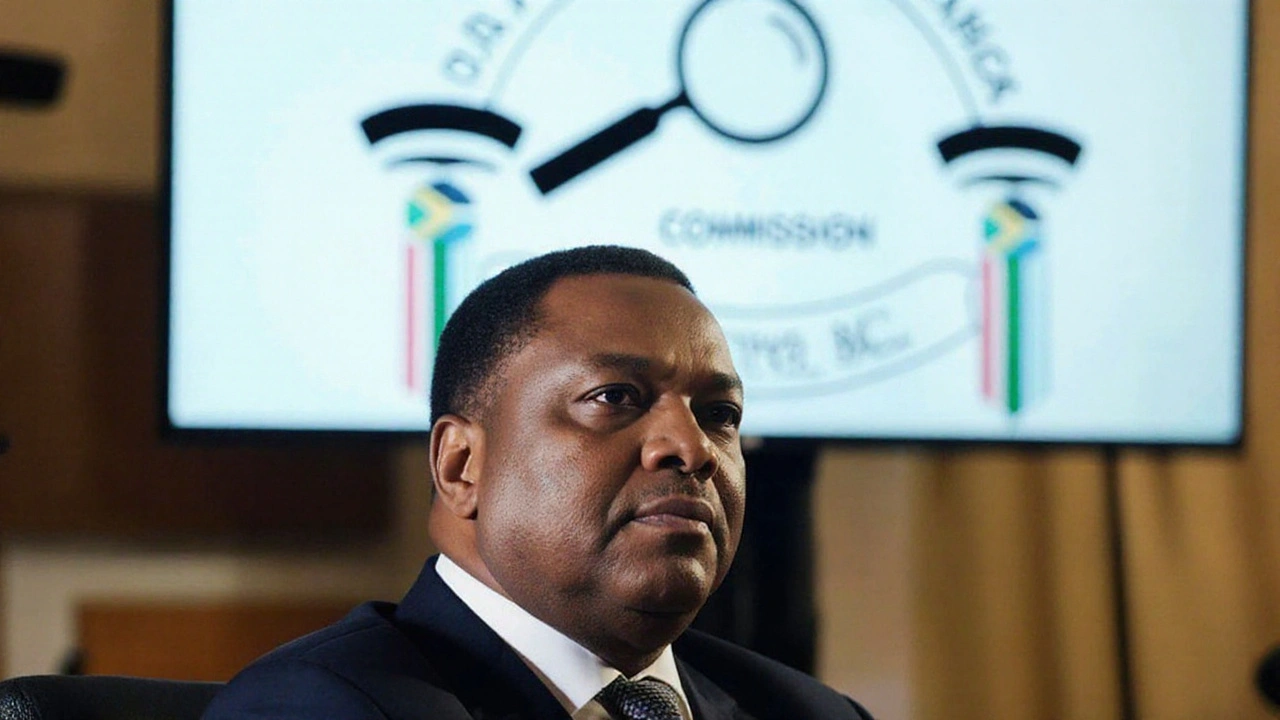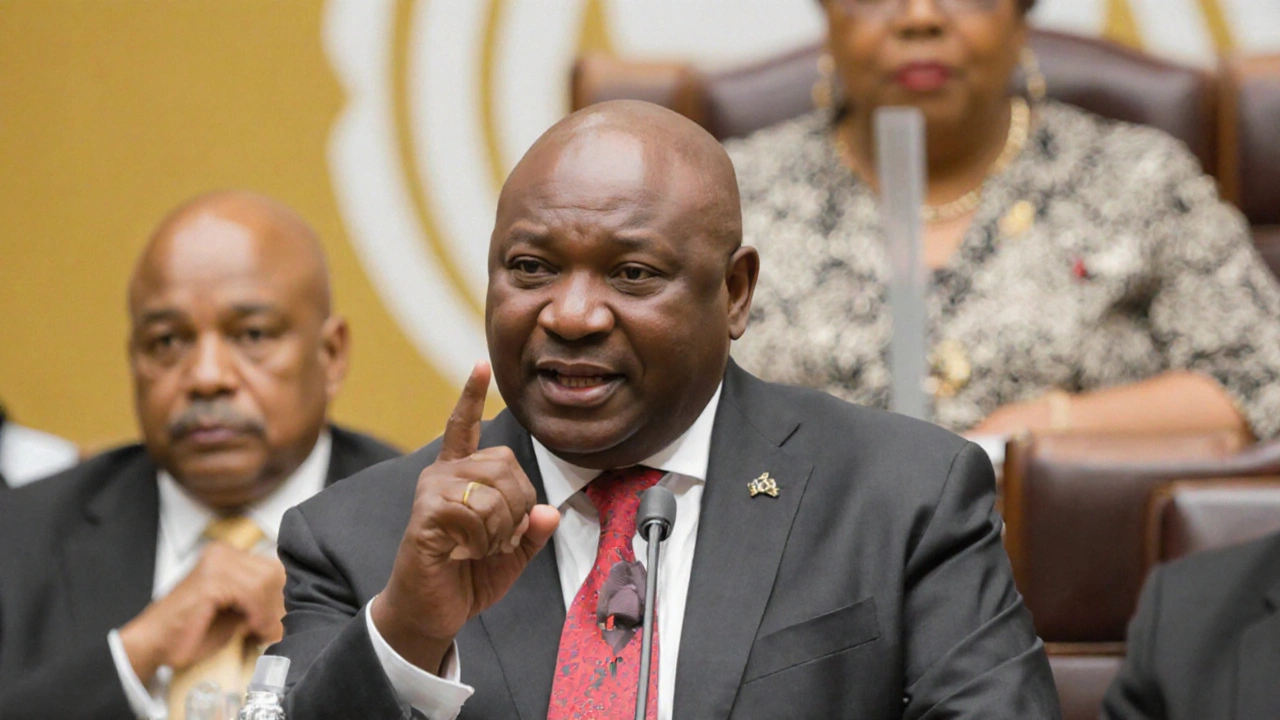Explosive Testimony Sets the Tone
The Madlanga Commission convened on Monday with a promise to untangle a web of alleged corruption, political meddling and systemic failures inside South Africa’s criminal justice system. The week’s headline was the testimony of KwaZulu‑Natal Police Commissioner Nhlanhla Mkhwanazi, who turned the proceedings into a high‑stakes showdown.
Commissioner Mkhwanazi used his first appearance to back up the accusations he first aired in July. He painted a picture of a police service hijacked by senior political actors, pointing directly at Police Minister Senzo Mchunu. According to Mkhwanazi, the minister not only sat on a throne of influence but also maintained “close ties with syndicates that profit from crime.” The commissioner claimed Mchunu made a unilateral decision to dissolve the Political Killings Task Team (PKTT), a specialised unit that had been chasing politically motivated murders across the province.
The PKTT, Mkhwanazi argued, was far from a failing experiment. He cited several operations that resulted in high‑profile arrests, including a December 6, 2024 housing raid that netted suspects linked to the notorious Fenang murder case. The task team also executed multiple seizure warrants that uncovered weapons caches and financial trails pointing to politically linked gangs.
In his account, the minister’s decision to disband the PKTT was made without any formal briefing, and contrary to clear evidence of the unit’s effectiveness. “The minister concluded the task team was underperforming without ever seeing a single report,” Mkhwanazi said, stressing that the move jeopardised ongoing investigations and could embolden perpetrators of political violence.
He warned that some of the most sensitive documentation, including audio recordings and financial ledgers, would need to be examined in camera to protect the identities of witnesses and to safeguard national security interests.
- Alleged direct involvement of Police Minister Senzo Mchunu with criminal syndicates.
- Unilateral dissolution of the Political Killings Task Team despite its proven success.
- Evidence of recent successful operations, such as the December 6 housing raid.
- Potential financial mismanagement of funds earmarked for political‑killing investigations.
While the minister’s office has not yet responded publicly, the commissioner’s detailed allegations have already set off a chain reaction among civil‑society watchdogs and legal experts.

Implications, Reactions and the Road Ahead
Criminology specialist Kholofelo Rakubu described the first week as “a watershed moment for South Africa’s rule of law.” He warned that if the commission fails to act on these revelations, public confidence in law‑enforcement could erode further, creating a fertile ground for crime syndicates to flourish.
Accountability activist Koogan Pillay, representing the NGO Accountability Now, compared Mkhwanazi’s bravery to that of former whistle‑blower Babita Deokaran, whose own disclosures led to the infamous state capture investigations. Pillay stressed that protecting people who expose wrongdoing must become a priority, noting that journalists and investigators have faced intimidation, legal battles, and even threats to their lives.
Beyond the immediate political drama, the commission’s findings could have financial ramifications. If the allegations of misdirected funds are proven, the state may be forced to repay millions of rand, and senior officials could face criminal charges for fraud or abuse of office.
The Madlanga Commission has outlined a three‑phase plan:
- Gather and authenticate all documentary evidence presented by Commissioner Mkhwanazi.
- Conduct in‑camera hearings with key ministers, senior police officials and any implicated syndicate members.
- Publish a final report with recommendations for structural reform, including the possible reinstatement of the PKTT or a new independent body to oversee political‑killing investigations.
Legal scholars anticipate that the commission’s final recommendations could prompt legislative amendments, strengthening oversight mechanisms over the National Police Commissioner and the Minister of Police. Some suggest the creation of an autonomous “Political Violence Oversight Board” that would operate outside direct political control.
Meanwhile, civil‑society groups have already begun drafting petitions demanding immediate protection for whistle‑blowers and faster judicial processing of any charges that may arise from the commission’s work. Social media trends show a surge in calls for “transparent policing” and “zero tolerance for political meddling.”
As the Madlanga Commission moves beyond its opening week, the nation watches closely. The depth and credibility of the evidence presented could dictate whether South Africa takes a decisive step toward cleaning up its police service, or whether the status quo remains unchallenged. The stakes are high, not just for the politicians involved, but for every citizen who expects safety and justice under the law.


Author
Ra'eesa Moosa
I am a journalist with a keen interest in covering the intricate details of daily events across Africa. My work focuses on delivering accurate and insightful news reports. Each day, I strive to bring light to the stories that shape our continent's narrative. My passion for digging deeper into issues helps in crafting stories that not only inform but also provoke thought.